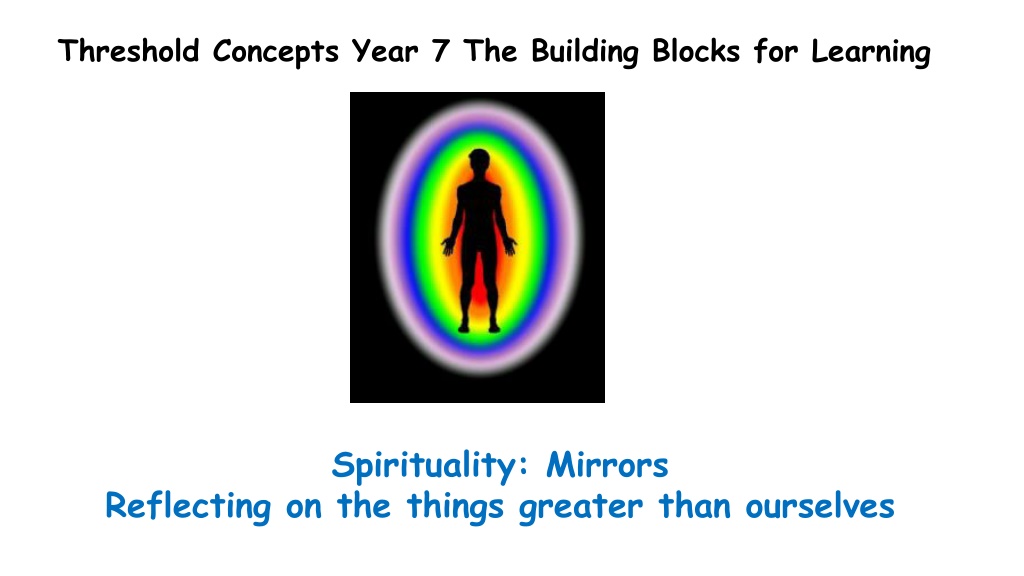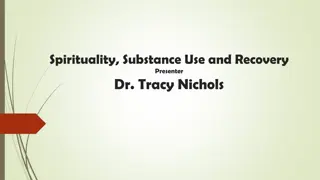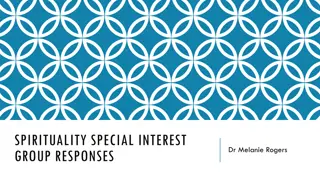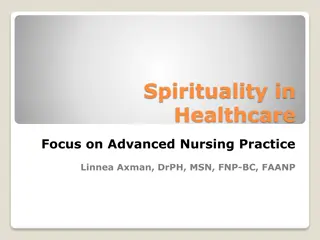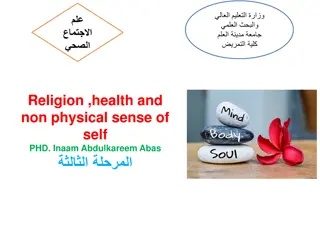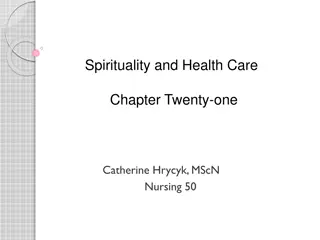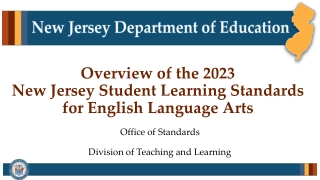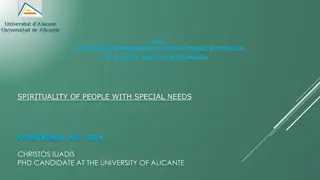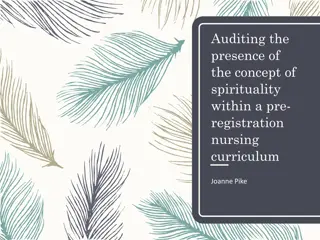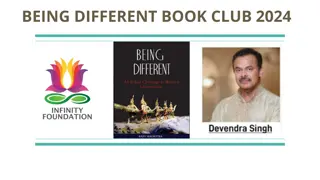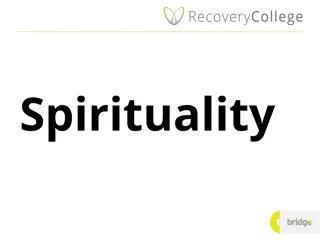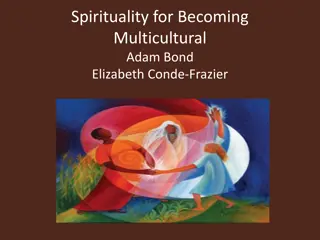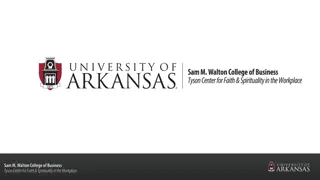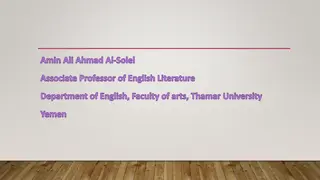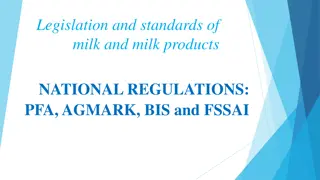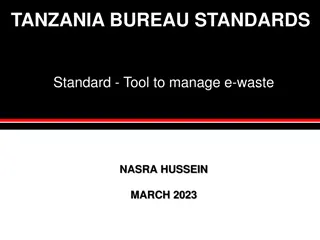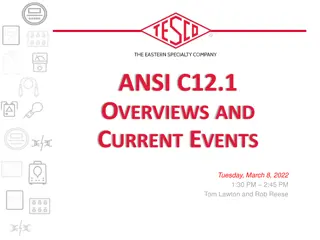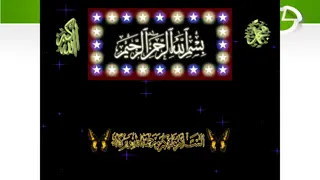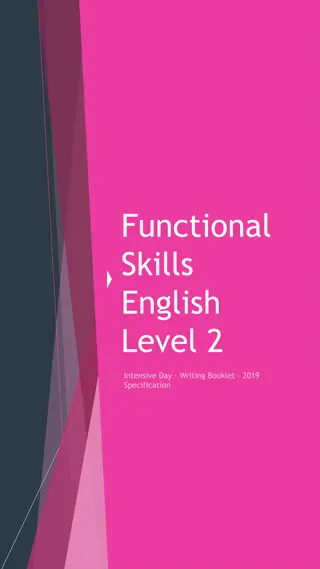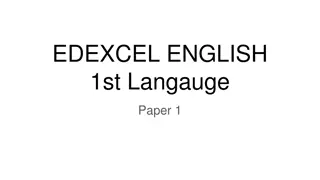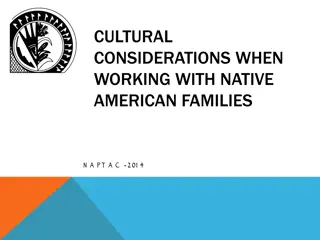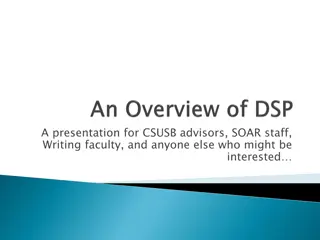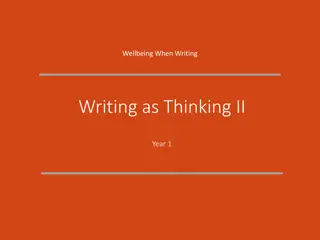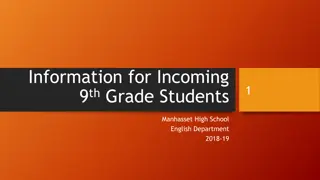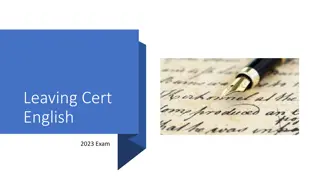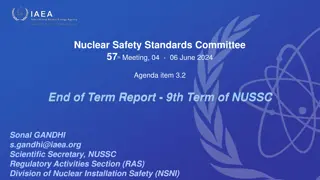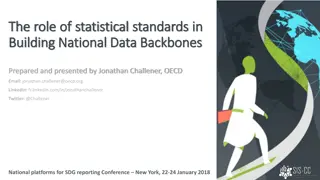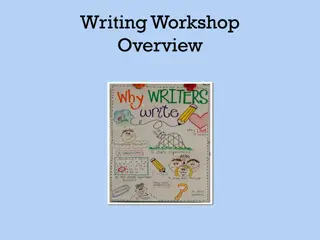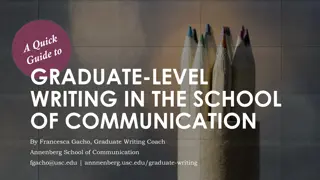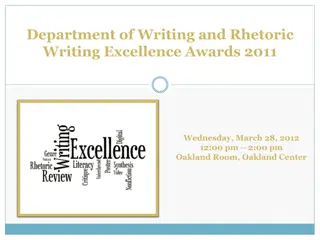Exploring Spirituality Through English Writing Standards for Year 7
Delve into the world of spirituality and English language arts with a focus on Threshold Concepts for Year 7 students. The content covers essential writing targets, reading strategies, and the emotional power of connected settings in literature, encouraging students to explore emotions and inner freedom through language and storytelling.
Download Presentation

Please find below an Image/Link to download the presentation.
The content on the website is provided AS IS for your information and personal use only. It may not be sold, licensed, or shared on other websites without obtaining consent from the author. Download presentation by click this link. If you encounter any issues during the download, it is possible that the publisher has removed the file from their server.
E N D
Presentation Transcript
Threshold Concepts Year 7 The Building Blocks for Learning Spirituality: Mirrors Reflecting on the things greater than ourselves
English Threshold Concepts Year 7 Writing Targets Write legibly Capital letters: I, proper nouns & sentences Full stops Question marks Join clauses using and Most sentences make sense Exclamation marks Subordinating and coordinating conjunctions Apostrophes for contracted words Commas (for lists) Paragraphs Inverted commas Correct use of tense Non-narrative: structure e.g. headings & subheadings Narrative: describe settings and characters Commas (fronted adverbials) Apostrophes for possession A range of cohesive devices: conjunctions, adverbials, pronouns & synonyms Select vocabulary: e.g. Show don t Tell in narratives; technical words in non-narrative Begin to match level of formality to audience Legible, cursive handwriting Semicolons, colons, hyphens, dashes, commas for clarity (relative clauses, parenthesis) Dialogue, Action, Description DAD (correctly punctuated) A range of sentence structures to match audience and purpose (incl. passive) Narrative: create atmosphere Begin to use punctuation to enhance meaning Control the level of formality Non-narrative: effectively organise information and ideas Narrative: create an effect (e.g. tension) Precise use of punctuation to enhance meaning Ambitious and precise vocabulary Structure a text using a range of appropriate conventions The voice of an author Create extended imagery (using figurative language with precision) Develop a theme 1 English Threshold Concepts Speaking Speak clearly and confidently Communicate effectively with vocal and body language 2 Reading Read for pleasure Read fluently Extract ideas and information from a text Identify the meaning of words in context Make inferences supported by evidence Understand writers techniques and viewpoints Understand the audience and purpose of writing Use formal structures to support analysis TEA (and PEAL in the summer term) Use the analysis verbs demonstrates and suggests 3 4 5 Writing Use neat, cursive script to present with pride Use a range of punctuation to support meaning Use a range of sentence and text structures to support meaning Spell correctly to communicate clearly Use ambitious vocabulary Use subject vocabulary 6 7 8 Greater Depth
Skellig The Emotional Power of Connected Settings: English Threshold Concepts Spirituality: Can exploring emotions lead to the search for inner freedom? Description Reading Read fluently Extract ideas and information from a text Make inferences supported by evidence Understand writers techniques and viewpoints Use formal structures to support analysis TEA Use analysis verbs demonstrates and suggests Identify writers techniques language choice Sensory language Imagery (figurative language) Alliteration Onomatopoeia Simile Metaphor Personification Further Vocabulary analysis, TEA, feelings, emotions, suggests, demonstrates, compare, similarities, differences, hook, negative, positive Challenge:Whilst reading, explore how writers use settings to link with the emotions of characters.
Skellig - Relationships: English Threshold Concepts Spirituality: Can writing in role help us to explore emotions and make connects with others? Informal Letter Reading Read fluently Extract ideas and information from a text Make inferences supported by evidence Understand writers techniques and viewpoints Use formal structures to support analysis TEA Use analysis verbs demonstrates and suggests Identify writers techniques Short sentences Repetition Direct speech Simile Metaphor Further Vocabulary analysis, TEA, feelings, emotions, suggests, demonstrates, present, compare, similar, different Challenge:Whilst reading Skellig, further explore Michael s relationships with the characters in the novel.
Skellig The Poetry of William Blake: English Threshold Concepts Spirituality: Can the natural world help us flourish? Reading Read fluently Extract ideas and information from a text Make inferences supported by evidence Understand writers techniques and viewpoints Identify writers techniques - Poetry Senses: Touch, Smell, Taste, Sight, Hearing Figurative language: Alliteration, Onomatopoeia, Repetition, Simile, Metaphor, Personification Symbolism Structure: Verse, Rhyme, alternate, couplets Punctuation Further Vocabulary rhyme scheme, negative, positive Challenge: Explore further, how William Blake influenced David Almond s ideas and themes in Skellig.
Canterbury Tales Pilgrimage: English Threshold Concepts Spirituality: Can pilgrimage help us search for inner freedom and connect us with self, others and something beyond? Persuasive leaflet Reading Read fluently Extract ideas and information from a text Understand writers techniques and viewpoints Identify writers techniques - Persuasion Facts Opinion Repetition Rhetorical questions Exaggeration Further Vocabulary summary, main point, Challenge: Whilst reading, can you identify how a character s journey brings about change.
1001 Arabian Nights Shahrazad: English Threshold Concepts Spirituality: Can writing help us to connect with others? Speech Reading Read Fluently Understand the audience and purpose of writing Make inferences supported by evidence Understand writers techniques and viewpoints Reading Writers Techniques Persuasion Content Structure AFORREST: Alliteration, Facts, Opinion, Repetition, Rhetorical questions, Exaggeration, Statistics, Three (rule of three). Further Vocabulary Frame story Challenge: Read further stories from 1001 Arabian Nights.
1001 Arabian Nights Sinbad: English Threshold Concepts Spirituality: Can writing help us to connect with others? Travelogue Reading Read Fluently Understand the audience and purpose of writing Make inferences supported by evidence Understand writers techniques and viewpoints Identify writers techniques - Travelogue Personal pronoun I Recount past tense Informal, conversational writing Inner World thoughts, feelings,reflections Outer World See, hear, smell, touch, taste Further Vocabulary Frame story Challenge: Read further stories from 1001 Arabian Nights.
Canterbury Tales Context: English Threshold Concepts Spirituality: Can a study of history help us to understand where we ve come from, and where we are going to? Reading Understand the audience and purpose of writing Identify the meaning of words in context Make inferences supported by evidence Understand writers techniques and viewpoints Use formal structures to support analysis TEA Use the analysis verbs demonstrates and suggests Writers Techniques Positive words and phrases Further Vocabulary Old English, Middle English, Modern English, context, prologue, phrase, positive, noun, adjective Challenge: Read further stories from The Road to Canterbury. Explore the morals of the stories told by the pilgrims. How is the storyteller linked to the story?
Canterbury Tales Context: English Threshold Concepts Spirituality: Can moral tales help us to find meaning and purpose in the things we value? Narrative a moral tale Reading Read Fluently Understand the audience and purpose of writing Make inferences supported by evidence Understand writers techniques and viewpoints Writers Techniques - Moral Tale 3 main characters, someone to warn the characters, Death Treasure, Greed and Trickery A Storyteller Dialogue to lead the action The moral: the love of money is the root of all evil Further Vocabulary Middle English, Modern English, moral Challenge: Read further stories from The Road to Canterbury. Explore the morals of the stories told by the pilgrims. How is the storyteller linked to the story?
Progression steps build on prior learning Grammar Grammar/Punctuation Punctuation 1. SOS Sentences Capital letters, full stop 2. Apostrophes 3. Nouns 4. Determiners 5. Verbs 6. Simple Tense 7. Pronouns 8. Commas 9. Adjectives 10. Inverted Commas 11. Reported Speech 12. Relative Clauses 13. Prepositions 14. Expanded noun phrases 15. Simple Sentences/Main clause 16. Active Verb Form (Subject, Verb, Object) 17. Coordinating Conjunctions 18. Subordinating Conjunctions/ Subordinating Clause 19. Adverbs 20. Modal Verbs 21. Fronted Adverbials 22. Parenthesis 23. Progressive Tense 24. Semicolons 25. Colons 26. Hyphens 27. Passive verb form 28. Perfect Tense 29. Dashes 30. Perfect Progressive Tense Other: Subjunctive, Sentence Patterns, Question tags Grammar Punctuation & Spelling: English Threshold Concepts Teaching GPS Include daily practise: top tips, whiteboard retrieval practice, SMHW quizzes, learning bookmark and SATS-style tests. Steps to Success Step 1: Identify Step 2: Describe Step 3: Produce Step 4: Reason and Justify Step 5: Create use in your writing. Lists of sentences each using the threshold concept. Year 5 Year 6 Embed learning into reading/writing units for introduction and retrieval practice KS3: Repeat teaching to embed learning within schemes of learning as appropriate to text type and needs of students.
